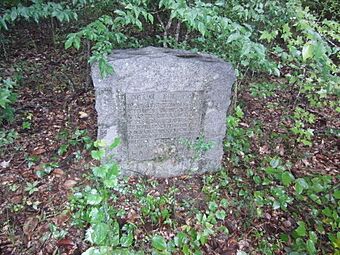Cotton Gin Port, Mississippi facts for kids
Quick facts for kids |
|
|
Cotton Gin Port Site
|
|

Historical Marker at the Cotton Gin Port Site
|
|
| Nearest city | Amory, Mississippi |
|---|---|
| Area | 100 acres (40 ha) |
| NRHP reference No. | 72000700 |
| Added to NRHP | October 18, 1972 |
Cotton Gin Port was once a busy town in Monroe County, Mississippi, United States. Today, it is known as a ghost town. This means the town was abandoned and no longer has people living there.
Contents
Where Was Cotton Gin Port Located?
Cotton Gin Port was found on the east side of the Tombigbee River. You can find its old location at these coordinates: 33°58′15″N 88°32′35″W / 33.97083°N 88.54306°W.
A Glimpse into the Past: The History of Cotton Gin Port
Cotton Gin Port was the very first town in what is now northern Mississippi where Europeans settled. It was built right on the Tombigbee River. This spot was important because many Native American trails crossed here.
Early Explorers and Territories
French explorers visited this area long ago. Jean-Baptiste Le Moyne de Bienville came in 1736. Later, Vaudreuil explored in 1752.
After the United States took control of this land, it was first thought to be part of Marion County in the Alabama Territory. However, new border lines were drawn between 1820 and 1821. These new lines placed Cotton Gin Port and its surrounding area into the state of Mississippi.
The First Cotton Gin and Trading Post
In 1801, the early U.S. government built a cotton gin at Cotton Gin Port. A cotton gin is a machine that quickly separates cotton fibers from their seeds. This was part of a "plan of civilization" for the local Chickasaw people. The government wanted the Chickasaw to adopt European-American ways of life.
Soon, Cotton Gin Port became a well-known trading post. People came here to do business with the Chickasaw.
The Gaines Trace Road
A special road called Gaines Trace was built to the town between 1811 and 1812. This road started near what is now Muscle Shoals on the Tennessee River. It led all the way to Cotton Gin Port, where it crossed the Tombigbee River. From there, the road continued south to Fort Stoddert, Alabama.
Why Cotton Gin Port Became a Ghost Town
As new railroads were built, they changed how towns grew. The Kansas City, Memphis & Birmingham Railroad did not go through Cotton Gin Port. Instead, it built a new railroad town nearby called Amory, Mississippi.
When the railroad bypassed Cotton Gin Port, businesses and people started to move. They wanted to be closer to the new railroad in Amory. Because of this, Cotton Gin Port was eventually abandoned. This happened to many old towns when railroads changed travel and trade routes.
What Remains Today
You can still find the old ruins of Cotton Gin Port. They are located between the Tenn-Tom Waterway and the Tombigbee River. Some items from the old settlement are kept at the Amory Municipal Museum.
It is said that Levi Colbert, a chief of the Chickasaw, lived near Cotton Gin Port. His home was on a bluff west of the town. There was a large oak tree there, known as the council tree. This was a meeting place for tribal elders. The first cotton gin was built close to this important spot.
 | William L. Dawson |
 | W. E. B. Du Bois |
 | Harry Belafonte |



